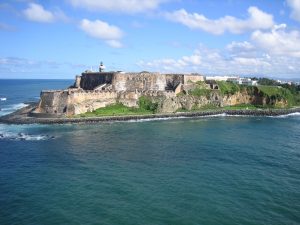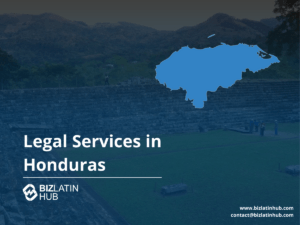Discover the key advantages of doing business in Brazil in 2025, including insights into its vast consumer market, strategic trade partnerships, and opportunities for foreign investors.
Doing business in Brazil in 2025 offers significant opportunities for foreign investors, thanks to its large consumer market, strategic location, and diversified economy. To encourage company formation in Brazil, the government has pledged to reduce intervention in local markets, fight corruption, encourage foreign participation and streamline bureaucratic processes. For investors seeking opportunities in emerging markets, doing business in Brazil presents promising prospects for growth and success. Companies doing business in Brazil benefit from its membership in MERCOSUR, access to international markets, and a commitment to attracting foreign investment.
| Is foreign ownership allowed in Brazil? | Yes, up to 100% ownership by foreign investors is permitted, although you will need a resident representative. |
| Company types that offer limited liability | Both the Ltda and S.A company types offer limited liability. |
| What international links does the country have? | Brazil is a founder member of both Mercosur and BRICS as well as other deals. |
| What is the business culture in Brazil? | Largely similar to North America and Europe, with limited cultural differences. |
| How big is the internal market? | Enormous – over 200m consumers and a rapidly growing middle class. |
5 Key benefits of doing business in Brazil
The 5 key benefits of doing business in Brazil:
- Large consumer market.
- International trade access to the rest of the Americas.
- Desirable geographic conditions.
- Openness to foreign investment.
- Great infrastructure for doing business.
1. Large consumer market
2. International trade access to the rest of the Americas
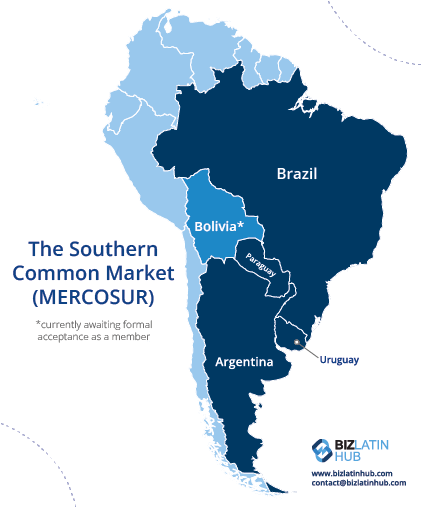
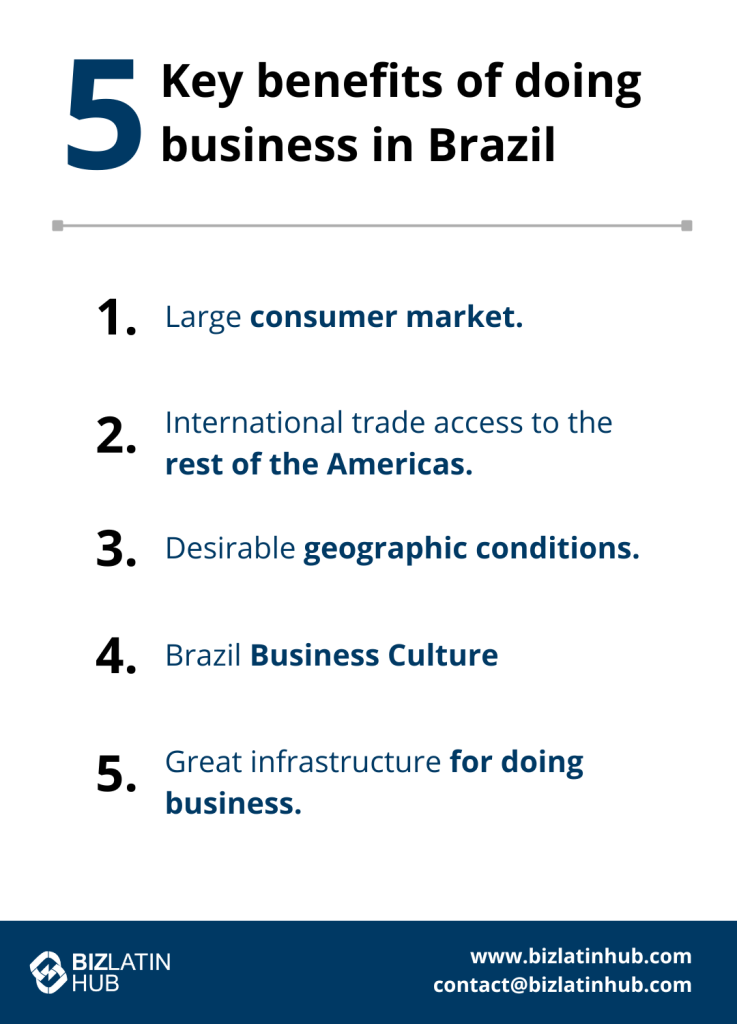
3. Desirable geographic conditions
4. Brazil Business Culture: Openness to foreign investment
5. Great infrastructure for doing business
There are 175 maritime and river ports in the country, 32 of which are public. There is therefore an extensive network of land and maritime logistics support for businesses moving goods across the country and internationally. Brazil is optimally set up as a key trading hub for South America.
Market opportunities for doing business in Brazil
Brazil’s diverse market presents investors with a raft of appealing commercial opportunities. While the Brazilian business environment has its complexities, partnering with a local group will ensure that you are able to successfully navigate these complexities and experience success in the market.
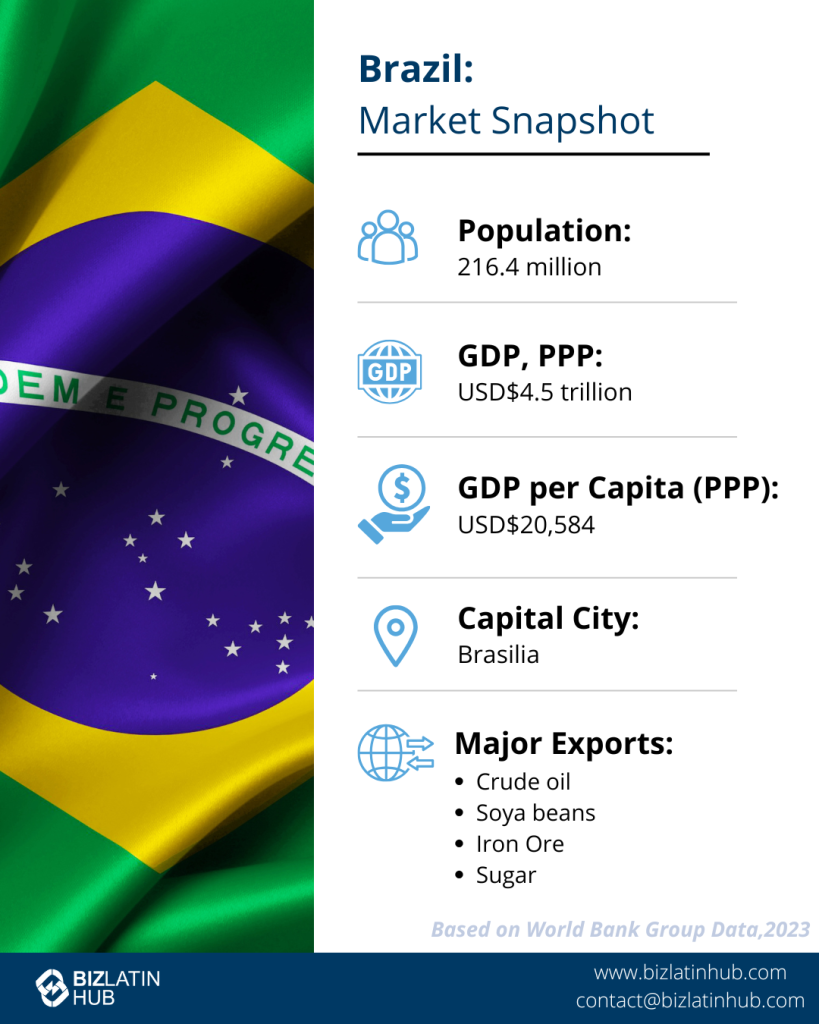
Key sectors for doing business in Brazil include agribusiness, energy, technology, infrastructure, and manufacturing, offering diverse opportunities for investors.
As mentioned, Brazil has traditionally been a global leader in agriculture, and this is still true today. Commercial opportunities are available to companies who have access to new technologies, equipment, and services, and who can modernize and make the agricultural sector more efficient.
This type of investment is true for other national sectors, including the energy sector, mobile application development, and financial technology, all of which are growing at an astounding rate.
Mining in Brazil
The Brazilian mining sector is often overlooked for those sectors in other high-performing economies such as Chile and Peru. However, it has a lot to offer foreign investors. Its relative size, and certain bureaucratic formalities that create a somewhat ‘natural barrier to entry’ for competitors, generates potential for commercial success that may be easier to achieve in other more saturated markets.
Mining experts in regions such as Canada, the US, and Australia should look to bring their METS (mining equipment, technology, and services) companies to Brazil to fill a market need for technological sophistication in one of the world’s largest producers of certain metals. With the new government seemingly ‘pro-mining’, barriers to entry will likely be managed or diminished over time, making the market more accessible for foreign mining companies.
Why Brazil Remains a Prime Investment Destination in 2025
Brazil continues to be a top choice for foreign investors in 2025, offering a stable economy, strategic geographic location, and a pro-business environment. The country’s commitment to infrastructure development and economic diversification further enhances its appeal.
Key reasons to invest in Brazil:
- Large Consumer Market – With a population exceeding 214 million, Brazil offers a vast market for goods and services.
- Strategic Trade Agreements – Brazil’s participation in MERCOSUR and other trade agreements facilitates access to regional and global markets.
- Diverse Economy – Brazil’s economy encompasses various sectors, including agriculture, energy, and technology, providing multiple investment avenues.
- Government Incentives – Various programs offer tax incentives and support for foreign investors in key sectors.
- Infrastructure Development – Ongoing investments in ports, airports, and transportation networks support efficient trade and business operations.
Local Tip:
When establishing a presence in Brazil, consider leveraging local expertise to navigate the complex regulatory environment and maximize operational efficiency.
4 Key steps to incorporate a business in Brazil
To start a company in Brazil, foreign investors must choose a legal structure (commonly a Sociedade Limitada or Sociedade Anônima), register with the Board of Trade (Junta Comercial), obtain a Tax Identification Number (CNPJ) from the Federal Revenue Service, and comply with local labor and tax regulations. The process typically takes 4–6 weeks with proper legal assistance.
Doing business in Brazil requires compliance with local regulations, including company registration with the Board of Trade (Junta Comercial), obtaining a Tax Identification Number (CNPJ), and adhering to labor and tax laws.
Once you have identified a market opportunity, you may wish to formally incorporate a business in Brazil. With the right specialist support, the process to incorporate a business in Brazil is relatively straightforward. The basic steps to setup a business include:
- Obtain tax ID numbers for shareholders.
- Draft the company bylaws and register the business.
- Open a company bank account.
- Register the company share capital with the Central Bank of Brazil.
Additionally, all companies in Brazil must meet some minimum corporate compliance requirements in order to remain compliant with the local authorities. These compliance requirements include:
- Appointment of a local director.
- Appointment of legal representatives for the company shareholders.
- Registration of a fiscal address within Brazil.
- Preparation and presentation of monthly tax declarations with the national tax authority.
To successfully incorporate a business in Brazil, you will need to engage with a local legal expert that can successfully guide you through this process and connect with all relevant government authorities. This will ensure you can do business in Brazil with minimal delay, and in full compliance with local law.
Local Insight for 2025:
Brazil’s commitment to economic diversification and infrastructure development continues to create new opportunities for foreign investors, particularly in sectors aligned with sustainable growth and innovation.
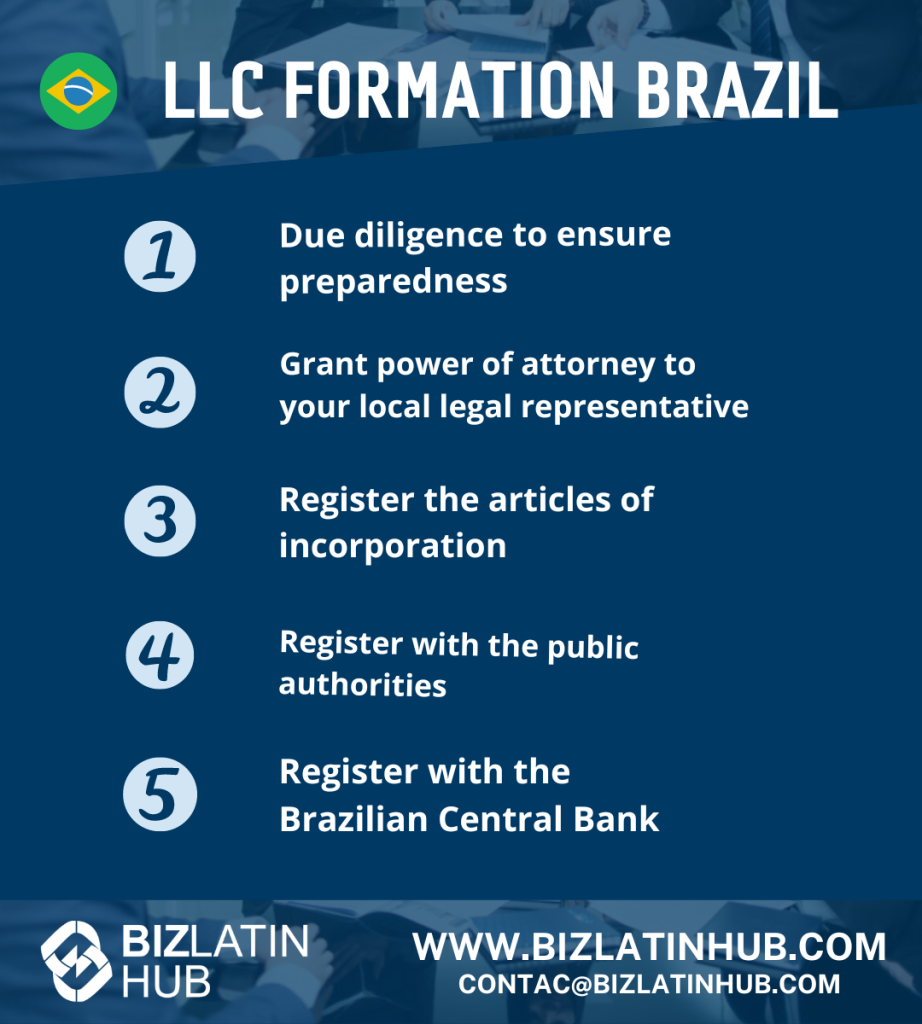
FAQs when doing business in Brazil
Answers to some of the most common questions our clients ask us about doing business in Brazil.
1. Can a foreigner own a business in Brazil?
Yes 100%, by either legal persons (legal entities) or natural persons (individuals).
2. How long does it take to register a company in Brazil?
It takes 10 weeks to register an operating company in Brazil.
3. What does an LTDA company name mean in Brazil?
In Brazil, when you come across LTDA in a company’s name, it stands for Sociedade Limitada. This corporate arrangement limits partners’ liability for their contributions to the company’s capital. Partners within an LTDA are not personally liable for the company’s debts beyond their initial investment.
This feature shields individual assets and provides a safeguard. This structure is common for small to medium-sized enterprises in Brazil, as it harmoniously blends partnership and corporate elements. It extends both flexibility and legal protections.
4. What does an S.A. company name mean in Brazil?
The S.A. in a company name in Brazil refers to a Sociedad Anónima, which is similar to a joint stock company. This legal framework establishes the company as a separate entity from its shareholders, with each shareholder possessing shares that represent their ownership stake.
Importantly, the financial responsibility of shareholders is solely to the value of their shares. The S.A. structure is common in Brazil due to its exceptional adaptability and flexibility, rendering it the favored option for certain business ventures.
5. What entity types offer Limited Liability in Brazil?
The Sociedade Limitada (Ltda.) is the principal Limited Liability Company type in Brazil. However, S.A. companies also offer limited liability to shareholders.
6. Is Brazil a good country for doing business in 2025?
Yes. Brazil offers a large consumer market, strategic trade partnerships, and diverse investment opportunities, making it an attractive destination for foreign businesses.
7. How long does it take to start a company in Brazil?
With legal support, incorporation and registration can take approximately 2 to 3 months, depending on the business structure and sector.
8. What types of businesses succeed in Brazil?
Businesses in agribusiness, energy, technology, infrastructure, and manufacturing thrive due to Brazil’s strategic advantages and supportive regulatory environment.
Biz Latin Hub supports foreign investors doing business in Brazil
Brazil is fast becoming one of the most desired Latin America economies for doing business. With the new government set to shake up the business environment and create more favourable conditions for foreign business, all eyes are firmly planted in Brazil.
If you’re considering doing business in Brazil in 2025, Biz Latin Hub offers comprehensive support for company formation, legal compliance, and strategic market entry.
To expand your business to Brazil, you’ll need a corporate law specialist on your team to ensure you can incorporate, register with tax authorities and begin operations in full compliance with Brazilian law.
Get in touch with Biz Latin Hub for specialist support. Our team has ample experience in assisting companies of all sizes to develop their operations through providing a range of customizable market entry and back-office services. Contact a member of our team today here at Biz Latin Hub for support.
Latin America offers a great environment for foreign mining companies looking to expand their operations. Check out the video below for more information on doing business in Brazil.
Learn about our team and expert authors.



